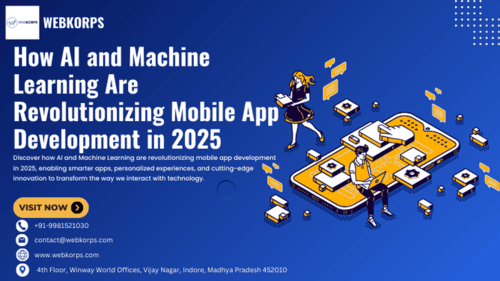How AI and Machine Learning Are Revolutionizing Mobile App Development in 2025

The mobile app development industry is constantly evolving, and in 2025, artificial intelligence (AI) and machine learning (ML) will take center stage. These technologies reshape how apps are developed, function, and interact with users. From creating smarter user experiences to automating app functionalities, AI and ML have become indispensable for developers aiming to stay ahead in a competitive digital ecosystem. This blog delves into how these technologies are revolutionizing mobile app development and why they are crucial for future-ready applications.
1. Enhanced Personalization
One of the most significant contributions of AI and ML to mobile app development is their ability to deliver personalized user experiences. By analyzing user behavior, preferences, and interactions, apps can tailor content, recommendations, and features to individual users.
Examples of AI-driven personalization:
- Streaming Apps: Platforms like Netflix and Spotify use AI algorithms to recommend shows, movies, and playlists based on user preferences.
- E-commerce Apps: AI-powered recommendation engines in apps like Amazon suggest products that align with the user’s browsing and purchase history.
- Fitness Apps: Apps like MyFitnessPal use AI to create personalized workout and nutrition plans based on user goals and habits.
Personalization not only improves user satisfaction but also boosts engagement and retention rates, making it a cornerstone of modern app development.
2. Smarter Automation and Efficiency
AI and ML streamline app development processes, reducing time and effort for developers. By automating repetitive tasks, these technologies allow developers to focus on innovation and complex problem-solving.
Key Areas of Automation:
- Testing and Debugging: AI tools like Test.ai can automate app testing, identifying bugs and performance issues more efficiently than traditional methods.
- Predictive Maintenance: ML models can predict potential app crashes or performance bottlenecks, enabling developers to address issues proactively.
- Content Generation: AI-powered tools assist in generating app content, from automated responses in chatbots to AI-written copy for user interfaces.
3. Advanced Predictive Analytics
Predictive analytics, powered by AI and ML, allows mobile apps to anticipate user needs and behaviors. By analyzing historical data, these technologies can predict future trends and offer proactive solutions.
Applications of Predictive Analytics:
- Healthcare Apps: AI in healthcare apps can predict potential health risks based on user data, encouraging preventive measures.
- Finance Apps: Apps like Mint and Robinhood use predictive analytics to provide users with financial forecasts and investment insights.
- Travel Apps: AI helps apps like Hopper predict the best times to book flights or hotels, saving users money and enhancing convenience.
Predictive capabilities add immense value by making apps more intuitive and user-centric.
4. AI-Powered Chatbots and Virtual Assistants
Chatbots and virtual assistants have become integral to modern mobile apps, offering seamless customer support and engagement. Powered by natural language processing (NLP), AI chatbots can simulate human-like interactions, enhancing user satisfaction.
Examples:
- Customer Support Apps: Chatbots in apps like Zendesk provide 24/7 assistance, resolving user queries quickly.
- Voice Assistants: Virtual assistants like Siri and Google Assistant enable users to perform tasks through voice commands, offering hands-free convenience.
- E-commerce Apps: AI chatbots in apps like eBay assist users with product searches, order tracking, and personalized shopping experiences.
5. Enhanced Security and Fraud Detection
With cyber threats on the rise, AI and ML have become vital in enhancing app security. These technologies can detect unusual activities, prevent fraud, and secure sensitive user data.
How AI Improves Security:
- Biometric Authentication: Apps use AI to enhance facial recognition, fingerprint scanning, and voice authentication for secure access.
- Fraud Detection: Finance apps use ML algorithms to identify suspicious transactions and prevent fraud in real time.
- Anomaly Detection: AI monitors user behavior and flags unusual activities, protecting apps from potential breaches.
By integrating AI-driven security features, developers can ensure their apps remain safe and trustworthy.
6. Revolutionizing User Interfaces (UI)
AI is redefining app design by enabling intelligent and dynamic user interfaces. These interfaces adapt to user preferences and behaviors, creating a more engaging and intuitive experience.
Examples of AI in UI Design:
- Adaptive Interfaces: Apps like Google Maps adjust their UI based on user context, such as driving or walking mode.
- Voice-Driven Interfaces: AI enables hands-free navigation and interactions through voice commands.
- Visual Recognition: AI-powered apps like Pinterest allow users to search for items using images rather than text.
Intelligent UIs not only improve usability but also set apps apart in a crowded market.
7. Future Trends in AI-Driven Mobile Apps
As AI and ML continue to evolve, they are set to unlock new possibilities in mobile app development. Here are some trends to watch in 2025:
- Hyper-Personalization: Apps will use even more granular data to deliver ultra-personalized experiences.
- Edge AI: AI processing on mobile devices (instead of cloud) will enhance speed and privacy.
- AI in Gaming: Mobile games will become more immersive and adaptive, thanks to AI-powered gameplay.
- AI for Sustainability: Apps will leverage AI to promote eco-friendly practices, such as energy tracking and waste reduction.
Conclusion
AI and machine learning are not just trends in mobile app development; they are transformative forces driving innovation and redefining user experiences. From enhanced personalization and automation to advanced security and predictive analytics, these technologies are shaping the future of mobile apps in 2025 and beyond. Developers who embrace AI and ML today will lead the way in creating smarter, faster, and more user-centric apps, ensuring they stay ahead in the ever-evolving digital landscape.